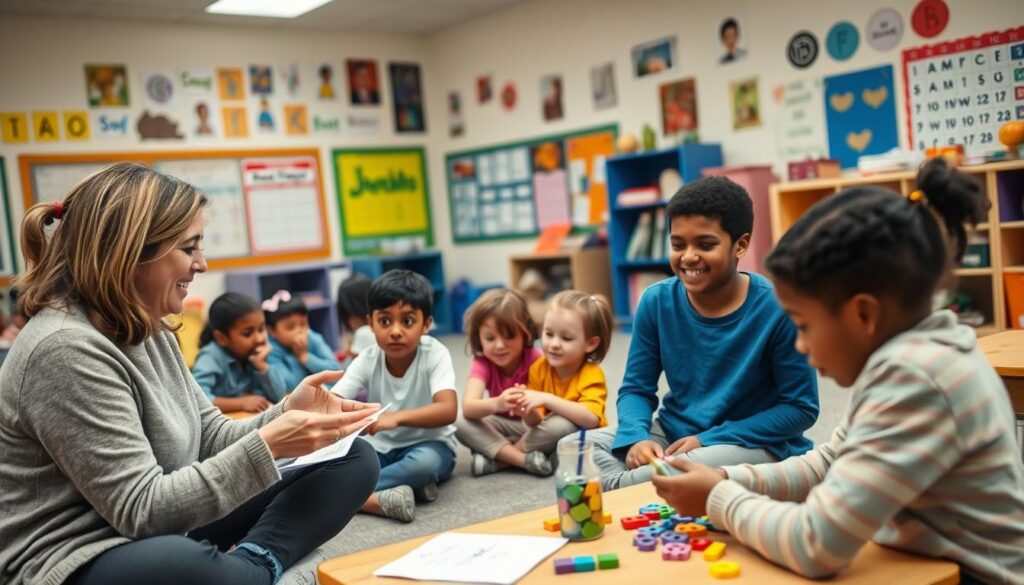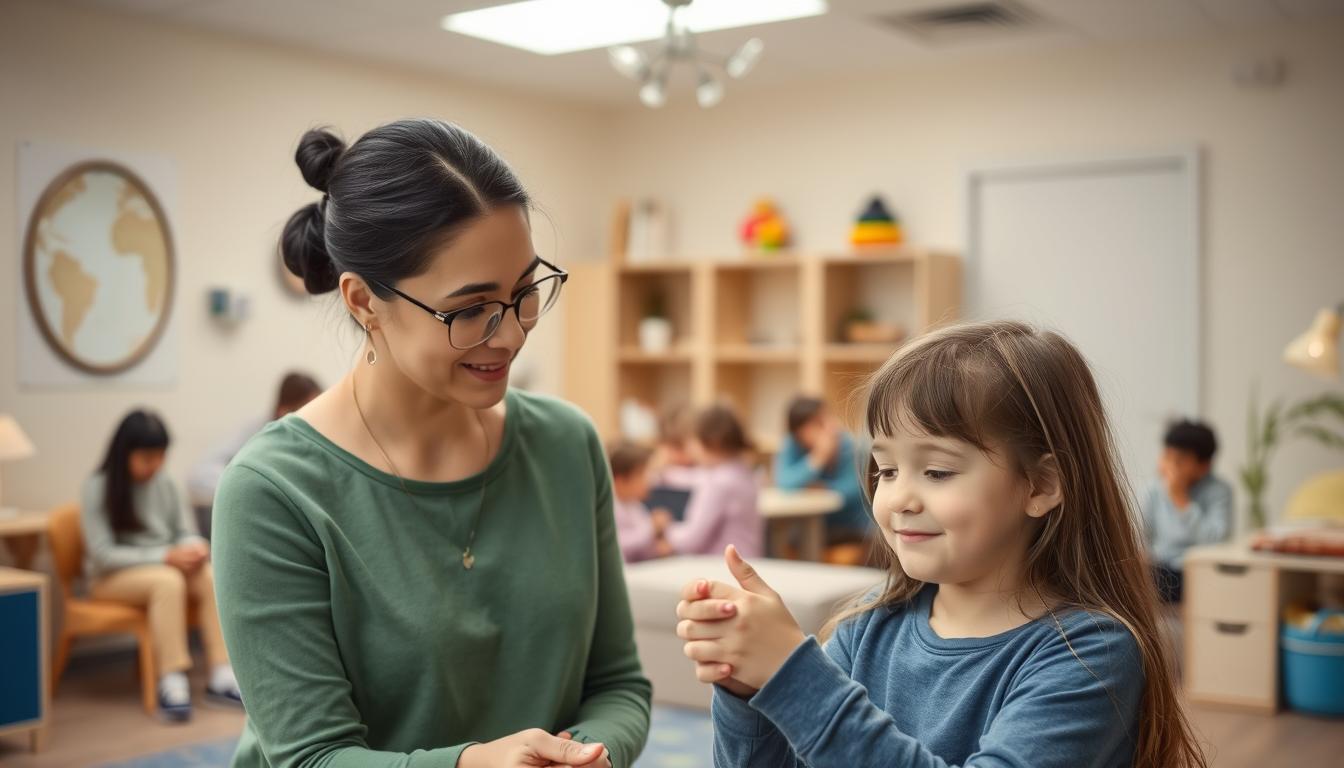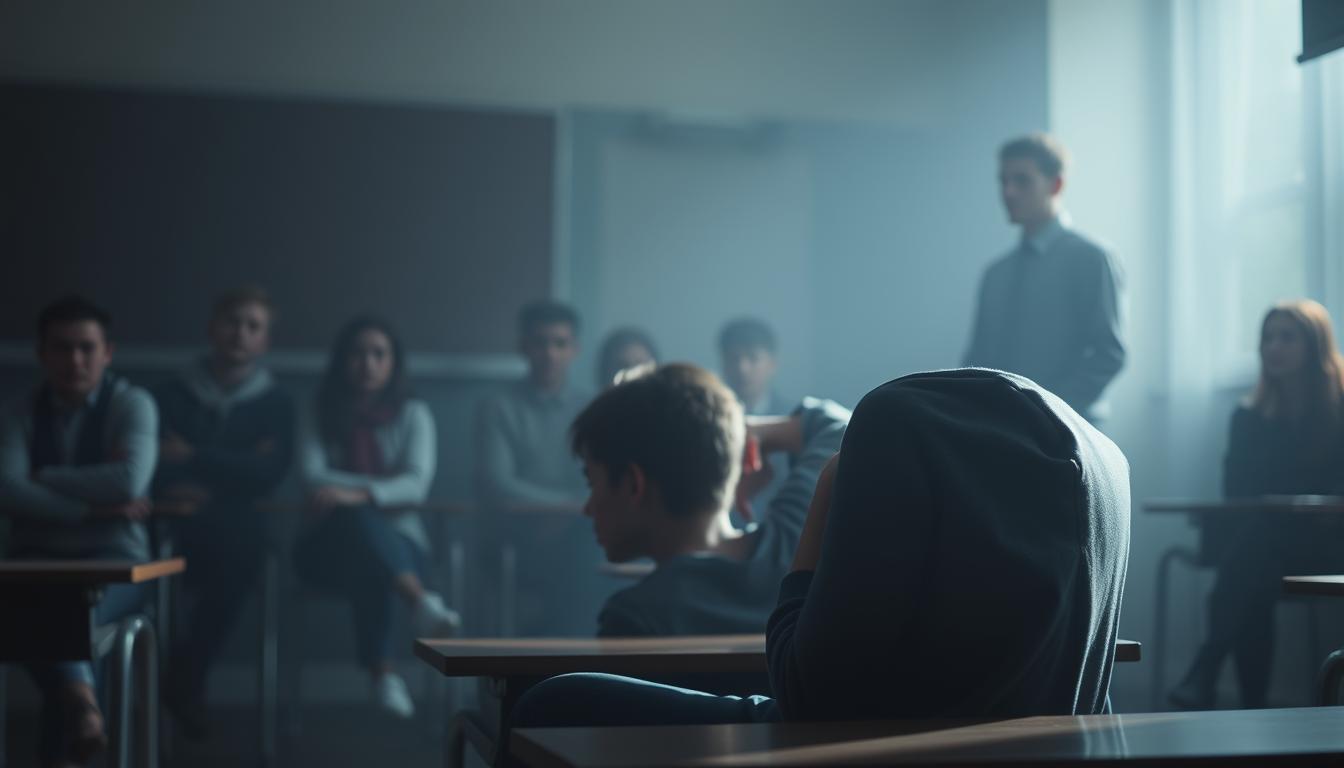Speech-language pathologists (SLPs) are key in helping students with autism, ADHD, and other neurodivergent traits. They offer speech-language pathology services, including speech therapy. These services aim to improve communication and help students succeed in school.
SLPs address the unique communication needs of students with autism, ADHD, and other neurodivergent traits. Speech therapy is a vital part of their services. Understanding how SLPs help these students can support them better, helping them reach their full potential.
Key Takeaways
- SLPs provide speech-language pathology services to support students with communication difficulties.
- Speech therapy for students with neurodivergent traits is a crucial part of SLP services.
- SLPs can help students with autism, ADHD, and other neurodivergent traits succeed in school.
- Speech-language pathology services are designed to address the unique communication needs of neurodivergent students.
- SLPs work with educators and parents to support neurodivergent students and help them achieve their full potential.
- Early intervention is critical in helping neurodivergent students develop effective communication skills.
Understanding How SLPs Can Help Students with Autism, ADHD, and Other Neurodivergent Traits
Speech-Language Pathologists (SLPs) are key in helping students with autism and ADHD. They teach communication skills for neurodivergent students. Through language therapy for autism and adhd, SLPs help these students get the skills they need to do well in school. Their goal is to give support for students with autism and adhd so they can do their best.
Some important parts of SLP support include:
- Assessing and addressing individual communication needs
- Developing personalized therapy plans
- Collaborating with educators and parents to create inclusive learning environments
Starting early is key for neurodivergent students. SLPs can help by giving support for students with autism and adhd early on. This helps them learn important communication skills for neurodivergent students. It can also make them more confident and help them do better in school.
Knowing how important SLP support is and the value of starting early helps everyone. Teachers and parents can work together to give neurodivergent students the tools they need. This teamwork makes learning more welcoming and supportive. It helps neurodivergent students reach their highest potential.
Essential Communication Skills Addressed by Speech-Language Pathologists
Speech-language pathologists are key in helping neurodivergent students. They focus on improving communication skills. This includes talking, body language, social skills, and being able to speak up for oneself. These skills are vital for success in school and beyond.
They help students feel more confident and independent. This way, they can reach their highest potential.
Some important communication skills they work on are:
- Verbal communication: This means improving how well they speak, including how fast and clear they are.
- Nonverbal communication: This includes using facial expressions, body language, and voice to show feelings and intentions.
- Social skills: They work on starting and keeping conversations, listening well, and solving problems to make and keep friends.
- Self-advocacy: This is about knowing oneself, expressing needs, and controlling one’s own actions to get what they want.
By helping students with these skills, speech-language pathologists support neurodiversity in schools. This makes schools more welcoming for everyone. It’s crucial for how slps support neurodivergent students
The role of speech-language pathologists is vital for neurodivergent students. They work on communication and neurodiversity to make schools better. This helps students do well and reach their goals.
Specialized Therapy Approaches for Autism Spectrum Disorder
Speech therapy is key for those with Autism Spectrum Disorder (ASD) to reach their goals. Speech-language pathologists (SLPs) offer vital support. They help develop communication skills and tackle challenges.
Effective strategies include social communication strategies. These help with starting and keeping conversations. They also aid in understanding nonverbal signals and forming friendships. Language processing techniques improve language understanding and use. Behavioral support methods help manage tough behaviors, creating a better learning space.
Speech therapy for ASD is customized to fit each person’s needs. It might include:
- Social skills training
- Language development programs
- Augmentative and alternative communication (AAC) systems
- Behavioral support and counseling
With the right therapy, people with ASD can do well in school and life. The right support helps them succeed and grow.
Supporting Students with ADHD Through Speech-Language Services
Speech therapy is key for students with neurodivergent traits to improve their communication skills. For those with ADHD, speech-language pathologists (SLPs) offer help. They focus on improving organization, self-regulation, and self-advocacy. SLPs tailor plans to meet each student’s specific needs.
Helping students with autism and ADHD often requires a team effort. This team includes speech therapy, occupational therapy, and special education. Together, they create a support system that meets each student’s unique needs. This teamwork helps students with ADHD do well in school and socially.

- Breaking down big tasks into smaller steps
- Using visual aids and graphic organizers for organization
- Teaching self-regulation techniques like deep breathing
- Helping students express their needs and wants
Speech therapy helps students with ADHD overcome communication hurdles. With the right support, they can reach their full potential. This support is crucial for their success in school and life.
Collaborative Approaches in Educational Settings
Speech-language pathologists are key in helping neurodivergent students in schools. They work with teachers, special educators, and parents to help each student. This teamwork ensures students get the support they need.
Early intervention and ongoing collaboration are vital for neurodivergent students. SLPs help create special plans for students. They also train teachers and work with parents to keep strategies consistent at home.
- Regular communication and progress updates with teachers and parents
- Co-planning and co-teaching with special educators
- Providing workshops and training sessions for educators and parents on topics such as neurodiversity, autism, and ADHD
Together, speech-language pathologists, educators, and parents make learning spaces inclusive. This teamwork helps all students, especially those with neurodivergent traits. It ensures everyone gets the support they need to thrive.
Measuring Progress and Adapting Support Strategies
Speech-language pathologists are key in helping neurodivergent students. They make sure support plans work well. Language therapy for autism and adhd is very effective when it fits each student’s needs. They use different tools and methods to check how students are doing and change their help as needed.
Some important steps in tracking progress include:
- Regular checks to see how well students communicate and grow
- Working with teachers and parents to keep support consistent
- Changing support plans to fit each student’s changing needs
Speech-language pathologists offer special help for students with autism and ADHD. By adding language therapy for autism and adhd to their plans, they can really help these students.
By teaming up and adjusting support plans, we can help neurodivergent students do well. Speech-language pathology services are vital in giving the right support and guidance. They help students face challenges and reach their goals.
Conclusion: Empowering Neurodivergent Students Through Specialized Support
Speech-language pathologists (SLPs) are key in helping neurodivergent students. They work with teachers and families to support students with autism, ADHD, and other conditions. This support helps students reach their full potential in school.
SLPs use special therapy methods to tackle communication and social skills issues. They also help with language and behavior. This approach helps students overcome challenges and fully participate in their learning.
SLPs create welcoming classrooms and work closely with parents. This ensures neurodivergent students get the care they need to do well. Together, we can help these students succeed in school and beyond.
FAQ
What is the role of speech-language pathologists (SLPs) in supporting neurodiverse students?
How can SLPs help students with autism, ADHD, and other neurodivergent traits?
What essential communication skills do SLPs address with neurodiverse students?
What specialized therapy approaches do SLPs use to support students with autism spectrum disorder (ASD)?
How can SLPs support students with ADHD through speech-language services?
How do SLPs collaborate with educators and parents to support neurodiverse students?
How do SLPs measure progress and adapt support strategies for neurodiverse students?




